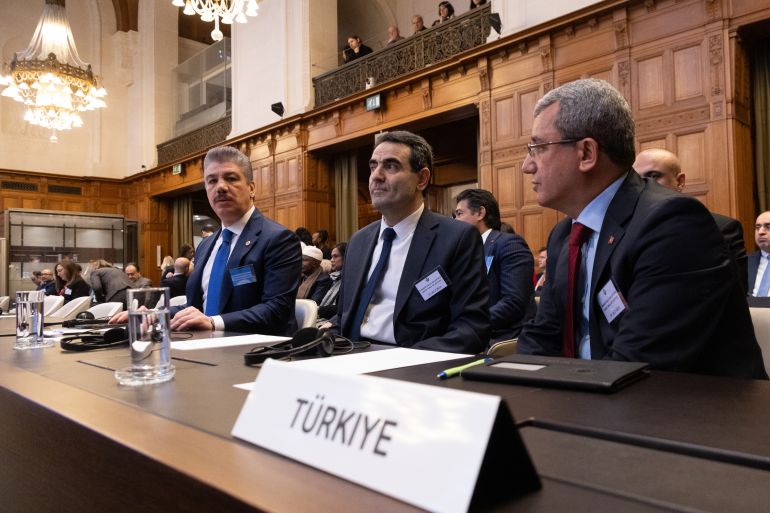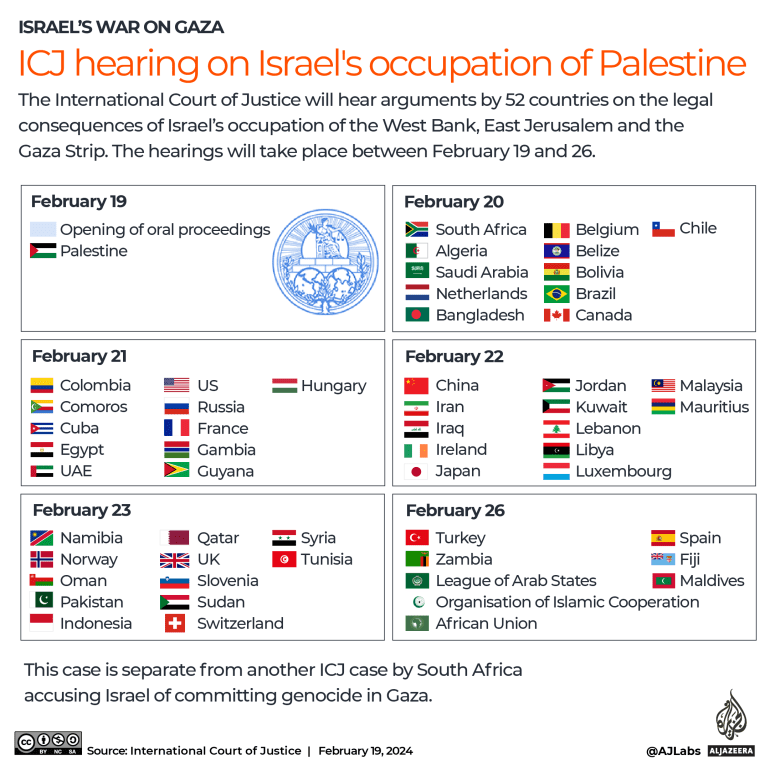‘Deepening occupation’: Turkey condemns Israel on last day of ICJ hearing
As the UN’s top court holds its final day of hearings, more countries assert Israel’s decades-old, illegal occupation of Palestine must end.

Turkey has joined a large number of countries that have condemned Israel’s decades-long occupation of Palestinian territories at the International Court of Justice (ICJ).
Turkey’s Deputy Foreign Minister Ahmet Yildiz was the first representative to speak on the last day of the hearings on Monday, capping a weeklong event that saw 52 countries and several international organisations testify to Israel’s occupation of Palestine.
Keep reading
list of 4 itemsChina tells ICJ justice ‘must not be denied’ to Palestinians
‘Israel’s apartheid must end,’ South Africa says at ICJ hearing
US tells ICJ Israel should not be ordered to immediately end occupation
He said the long-running conflict could have been settled by now if international and human rights laws were upheld by Israel and its Western allies, and emphasised how the United Nations Security Council has failed to protect the unalienable rights of the Palestinians.
He said the “deepening occupation by Israel of the Palestinian territories” and the failure of its allies to commit to implementing a two-state solution were the main underlying issues.
Reporting from outside the court in The Hague, Al Jazeera’s Bernard Smith said Turkey echoed many of the arguments that have been made by dozens of countries since last week.
“Turkey said Palestinians were subject to practices from the Middle Ages under occupation, it said that Palestinians only need emancipation with dignity,” he said.
“And there was particular focus from the Turks on the Haram al-Sharif as it is called by Muslims, or the Temple Mount as the Jews call it, which is supposed to be administered by the Jordanians in a longstanding principle dating to before the creation of the state of Israel. Turkey accuses the Israelis of frequently abusing the independence of Haram al-Sharif.”
This case is separate from the genocide case by South Africa against Israel for its ongoing war on Gaza, which has killed nearly 30,000 Palestinians since October 7, mostly women and children. The Israeli army has killed about 400 Palestinians in the occupied West Bank in the same period.
The Israeli military continued to shell various parts of the Gaza Strip during the ICJ hearing, killing more than 90 Palestinians and wounding 164 in the 24 hours leading to the final hearing.
Tamer Qarmout, assistant professor of public policy at Doha Institute for Graduate Studies, said Turkey had taken more drastic measures in the past when dealing with Israel, including the severing of diplomatic and economic ties.
“But in this war, we have seen a different stand,” he told Al Jazeera, adding that the Turkish government is still critical of Israel but does not take similar positions like the ones in the past.
“I think [this] has to do with Turkey’s internal policies and politics,” he said, citing Turkey’s recovery from a serious economic crisis as a cause. “They [Turkish officials] don’t want to antagonise other key partners in the West by taking drastic positions.”

‘Racial domination’
The unprecedented scrutiny at the world’s highest court of Israel’s ongoing occupation and the system of apartheid it imposes on Palestinians comes after the UN General Assembly in December 2022 passed a resolution calling for an ICJ opinion.
The United States defended Israel at the hearings, which itself had refused to attend, claiming its presence would jeopardise a future settlement with Palestinians.
“Under the established framework, any movement towards Israel’s withdrawal from the West Bank and Gaza requires consideration of Israel’s very real security needs,” Richard Visek, a US State Department legal adviser, told the court last week.
Arab nations on Monday reiterated their diverging views from Washington on the issue, with the group of 22 countries telling the court it condemns violations of international law arising out of Israel’s “racial domination and apartheid perpetrated against the Palestinian people”.
“Palestinian people have been denied the exercise of their legal right to self-determination through the more than century-long, violent, colonial racist effort to establish a nation-state exclusively for the Jewish people in the land of Mandatory Palestine,” representative Ralph Wilde said.
Several other countries and organisations spoke at Monday’s hearing, including the African Union (AU), the Organisation of Islamic Cooperation (OIC), and Spain.
The AU’s representative, Hajer Gueldich, told the court, “Nothing can justify the unspeakable suffering and horrors inflicted on the population of Gaza”.
Gueldich added that Israel’s “ruthless war machine” had led to the widespread destruction of Palestinian properties, hospitals, and places of worship, and this case was a chance for the court to end Israel’s “impunity”.
Secretary-general of the OIC, Hissein Brahim Taha, condemned Israel’s aggression in Gaza and the occupied West Bank.
Taha said the OIC called for a “just lasting and comprehensive peace based on the two-state solution”.
The Spanish representative also said Palestinians in the occupied West Bank were experiencing “difficulties” with adequate healthcare, education and water.
“All these difficulties and restrictions infringe a number of rights of Palestinians residing in the territory occupied by Israel, which cannot be justified neither by military exigencies nor by the requirements of national security or public order,” the representative said.